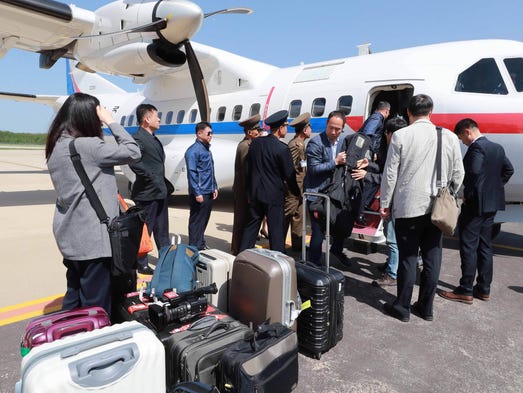Secretary of State Mike Pompeo says the U.S. is still working toward holding a historic summit with North Korea on June 12. (May 22) AP
WASHINGTON – Secretary of State Mike Pompeo said Wednesday that the United States would leave negotiations with North Korea if the upcoming meeting on leader Kim Jong Un's nuclear program goes south.
“A bad deal is not an option. The American people are counting on us to get this right. If the right deal is not on the table, we will respectfully walk away,” Pompeo said in his opening remarks for a House Foreign Affairs Committee hearing.
The nation's top diplomat has said that the United States is still working toward holding a historic summit with North Korea on June 12 in Singapore.
He called denuclearization of North Korea "our top national security priority."
"The maximum pressure campaign of diplomatic and economic sanctions is bearing fruit with the historic meeting set to take place on June 12th," and was supported by allies, Pompeo said. "Our posture will not change until we see credible steps taken toward the complete, verifiable, and irreversible denuclearization of the Korean Peninsula."
He said the administration is "clear-eyed about the regime’s history."
Past agreements with North Korea have resulted in many broken promises. "It’s time to solve this once and for all," he said.
Pompeo has met twice with North Korean leader Kim Jong Un, once in April as CIA director and earlier this month as secretary of State when he brought back three U.S. detainees held by North Korea.
Kim appeared genuine and engaged in conversation, Pompeo said.
"He knows the file. He doesn’t use notes. We had real conversations, not stilted talking points like we’ve had in the past with the North Koreans," Pompeo said. "He’s from a different generation. It’s my hope that when he meets with the president he’s willing to pursue a strategic shift."
Pompeo defined "denuclearization" as President Trump's goal for North Korea to eliminate its nuclear weapons arsenal, and its capacity to develop and deliver such weapons.
"There are multiple components of their system that threatens America," Pompeo said, including missiles, rocket engines, production of fissile nuclear material, and the capacity to produce that fissile material.
"The president has made clear we are prepared to provide security assurances" to Kim, "if we get a good deal," Pompeo said.
Pompeo also spoke about Trump's decision to ditch U.S. participation in the nuclear agreement with Iran that was negotiated by the Obama administration and five other world powers.
Pompeo on Monday detailed 12 demands that Trump expects Iran to meet as part of a new deal he hopes to negotiate, and that the U.S. would impose the toughest sanctions in history to bring that about.
"We will apply financial pressure, coordinate with our (Department of Defense) colleagues on deterrence efforts, support the Iranian people, and hold out the prospect of a new deal for Iran — if it changes its behavior," Pompeo said Wednesday. "We seek to work with as many partners, friends, and allies as possible to achieve the common objective of stopping all of Iran’s nuclear and non-nuclear threats."
The nuclear agreement reached with Britain, France, Germany, Russia, China and Iran "was based on the willingness to put additional sanctions in place" if Iran continued to engage in ballistic missile tests and terrorist activities across the Middle East, Pompeo said.
"No sanctions were put in place. ... And their missile activity continues," he said. "The sanctions are back in place today with a 180 day wind-down period."








































































































































































































































































































































































































































































































No comments:
Post a Comment